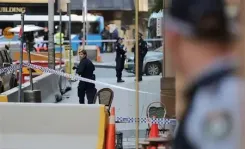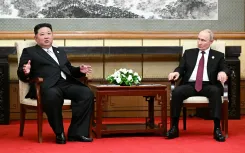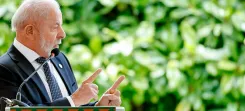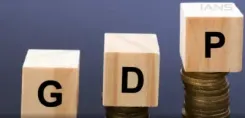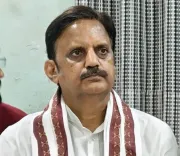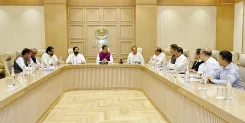Did North Korean Leader Kim Jong-un and Russian President Putin Discuss Key Issues in Beijing?

Synopsis
Key Takeaways
- Kim Jong-un and Putin held pivotal talks in Beijing.
- The meeting emphasizes strengthening bilateral ties.
- Trilateral solidarity among North Korea, Russia, and China is on the rise.
- The military parade marked a historic moment for international relations.
- Geopolitical tensions are likely to escalate as these nations collaborate.
Seoul, Sep 3 (NationPress) North Korean leader Kim Jong-un and Russian President Vladimir Putin engaged in bilateral discussions on Wednesday during a military parade in Beijing.
The two dignitaries convened at the Diaoyutai state guest house following their attendance at a military parade held at Tiananmen Square, commemorating the 80th anniversary of the conclusion of World War II in 1945.
In their dialogue, Kim conveyed gratitude to Putin for acknowledging his soldiers who are supporting Russia, reaffirming his commitment to enhance bilateral relations.
This meeting occurs amidst a growing collaboration between North Korea and Russia across various sectors, which includes North Korea's troop deployment to assist Russia in its conflict against Ukraine, as reported by the Yonhap news agency.
Earlier that day, Kim Jong-un positioned himself alongside Vladimir Putin and Xi Jinping at the forefront of the military parade in Beijing, marking the first assembly of leaders from Pyongyang, Moscow, and Beijing in 66 years.
This remarkable moment of Kim flanked by Putin and Xi in the viewing area of Tiananmen Square showcases their united stance against Western pressures, particularly from the United States.
Donning a black business suit and a gold tie, Kim joined Xi and Putin at the rostrum designated for top officials as the parade commenced with elaborate festivities at Tiananmen Square, a historic display of solidarity among China, Russia, and North Korea.
Putin was seated to Xi's right and Kim to his left, with Xi occasionally engaging Kim in conversation, their bodies oriented towards one another.
Earlier, Xi welcomed Kim into the square, shaking hands with him and other state leaders including Putin before proceeding to the rostrum.
Xi devoted additional time to greet Kim and Putin, gently touching their arms as a gesture of camaraderie.
The three leaders walked together along the red-carpeted path to the rostrum, exchanging smiles and conversations, before individually shaking hands with Chinese veterans.
Post-parade, the trio attended a reception at the nearby Great Hall of the People, once again appearing in unison.

